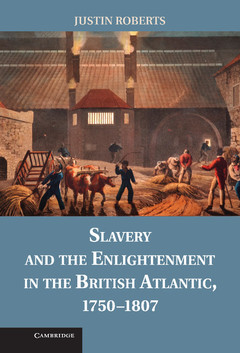Description
Slavery and the Enlightenment in the British Atlantic, 1750–1807
Author: Roberts Justin
This book focuses on how Enlightenment ideas shaped plantation management and slave work routines.
Language: English
Subject for Slavery and the Enlightenment in the British Atlantic...:
Approximative price 130.19 €
In Print (Delivery period: 14 days).
Add to cart
Slavery and the Enlightenment in the British Atlantic, 1750-1807
Publication date: 07-2013
Support: Print on demand
Publication date: 07-2013
Support: Print on demand
Approximative price 43.23 €
In Print (Delivery period: 14 days).
Add to cart
Slavery and the Enlightenment in the British Atlantic, 1750-1807
Publication date: 04-2018
Support: Print on demand
Publication date: 04-2018
Support: Print on demand
Description
/li>Contents
/li>Biography
/li>
This book examines the daily details of slave work routines and plantation agriculture in the eighteenth-century British Atlantic, focusing on case studies of large plantations in Barbados, Jamaica and Virginia. Work was the most important factor in the slaves' experience of the institution. Slaves' day-to-day work routines were shaped by plantation management strategies that drew on broader pan-Atlantic intellectual and cultural principles. Although scholars often associate the late eighteenth-century Enlightenment with the rise of notions of liberty and human rights and the dismantling of slavery, this book explores the dark side of the Enlightenment for plantation slaves. Many planters increased their slaves' workloads and employed supervisory technologies to increase labor discipline in ways that were consistent with the process of industrialization in Europe. British planters offered alternative visions of progress by embracing restrictions on freedom and seeing increasing labor discipline as central to the project of moral and economic improvement.
Introduction; 1. Clock work: time, quantification, amelioration, and the Enlightenment; 2. Sunup to sundown: agricultural diversity and seasonal patterns of work; 3. Lockstep and line: gang work and the division of labor; 4. Negotiating sickness: health, work, and seasonality; 5. Labor and industry: skilled and unskilled work; 6. Working lives: occupations and families in the slave community; Conclusion.
Justin Roberts is an Assistant Professor at Dalhousie University in Halifax, Nova Scotia, where he specializes in the study of slavery and the Atlantic World. He is the recipient of multiple fellowships, including awards from the Huntington Library, John D. Rockefeller Library, John Carter Brown Library, Virginia Historical Society, Library Company of Philadelphia, and the Robert H. Smith International Center for Jefferson Studies. Professor Roberts has published articles on slavery in the William and Mary Quarterly, Slavery and Abolition, and Historical Geography. He received his Ph.D. from The Johns Hopkins University.
© 2024 LAVOISIER S.A.S.




